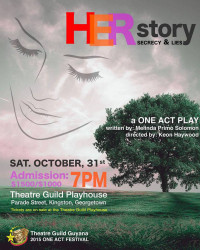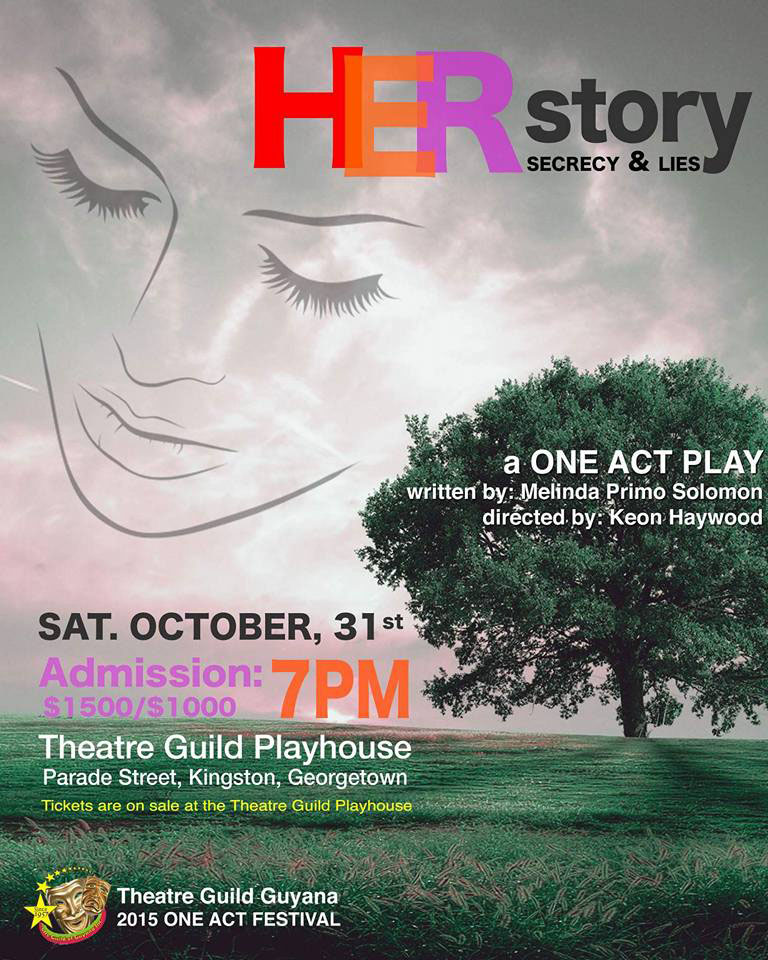The Theatre Guild of Guyana staged a Festival of Plays at the Playhouse in Kingston last week-end in which four new plays and playwrights were presented. That was a revival of this kind of activity at the Guild and an avenue for the creation of new work, as well as for the development of different skills in theatre production, and to help the institution to honour its commitments to an audience. It also revealed interesting confirmation of a trend in the Guyanese stage.
 There are records in the history of this theatre that it has been a place and an initiator for the hosting of drama festivals. This was a high point in the national theatre during the 1960s when there were competitions among one-act plays with prizes awarded for the best productions and performances. The groups then would perform plays available to them from different parts of the world or West Indian plays mostly made available because of the collection and publication of the University College of the West Indies (UCWI), later UWI Extra Mural series for which Errol Hill was largely responsible.
There are records in the history of this theatre that it has been a place and an initiator for the hosting of drama festivals. This was a high point in the national theatre during the 1960s when there were competitions among one-act plays with prizes awarded for the best productions and performances. The groups then would perform plays available to them from different parts of the world or West Indian plays mostly made available because of the collection and publication of the University College of the West Indies (UCWI), later UWI Extra Mural series for which Errol Hill was largely responsible.
During that time Guyanese drama was still a work under construction and had not yet generated any large volume of local plays. In fact, the Guild itself was playing a role in that development. There was a playwriting competition and, both in and out of that competition, members of the Guild were beginning to write, and some of these plays have become part of the work that contributed to the growth of local Guyanese drama. The most notable product of that competition was Sheik Sadeek who became one of the foremost and most important dramatists contributing to this phase of Guyanese theatre. Two others were Frank Pilgrim and Francis Quamina Farrier. Even later, Bertram Charles emerged.
 A very important festival eventually used the Guild Play-house as its final venue. This was the Bookers Sugar Estate Drama Festival, founded by Frank Thomasson, later to become the GuySuCo Estates Drama Festival and even later revived by Harold Davis as the GuySuCo Head Office Drama Group festival. This, at its heights, was a competition among the various sugar estates around the country which held their finals at the Guild Playhouse until Davis’ version of it petered out in the 1980s.
A very important festival eventually used the Guild Play-house as its final venue. This was the Bookers Sugar Estate Drama Festival, founded by Frank Thomasson, later to become the GuySuCo Estates Drama Festival and even later revived by Harold Davis as the GuySuCo Head Office Drama Group festival. This, at its heights, was a competition among the various sugar estates around the country which held their finals at the Guild Playhouse until Davis’ version of it petered out in the 1980s.
Most recently, the Guild ran a Festival of One-Act Plays between 2010 and 2013 around the same time that classes in playwriting were held; so there was quite a link between the performance of plays in that festival and the creation of new plays in those classes. Notable in that development was what happened in 2012, when there was both the Merundoi project and the Guild’s one-act festival which, together, produced several new plays, writers and directors. A further important factor was the way they flowed upward into the newly formed National Drama Festival.
Even spreading out beyond the one-act festival, was the once annual Theatre Guild Awards. These were given for all productions staged at the Playhouse for the year under review, taking in both in-house Guild and non-Guild productions in drama and dance. Over the years they generated a high level of competitiveness and rivalry which was stimulating and provided incentive, but was not always wholesome. Another thing about these awards and festivals is that they have always been sporadic, because the annual awards used to be a tradition which survived into the 1990s before ceasing. It was resuscitated after 2008 and once again subsided.
The 2015 Theatre Guild Festival of Plays is therefore a revival. Festival Director Simone Dowding explained that in this new edition, it is not limited to one-act plays. There were four contenders: Playing Chess With A Blind Man written and directed by Rae Wiltshire (October 29); Black Rainbow by Sidney Henry, directed by Frederick Minty; Creative Burial Ground by Rae Wiltshire, directed by Sidney Henry (October 30); Her Story: Secrecy and Lies by Melinda Primo-Solomon, directed by Keon Heywood (October 31).
Two of them are entirely new scripts and produced for the first time on stage. One is a re-work of a play first done in 2014 and now presented with a revised script and a new cast. The other was written and first performed in 2013, and now done again with a different cast. They therefore represent new work all round, and have espoused to the public, three new playwrights and directors, with interesting insights about contemporary preoccupations and trends on the Guyanese stage.
It is remarkable how the new Guyanese playwrights are preoccupied with the darker side of human existence. Comedy and laughter have been the dominant forms across the Caribbean for decades, to the point where many have repeatedly expressed a concern for the survival of anything with a serious interest in the art outside of popular humour. Only popular plays can expect full houses in Guyana, yet another trend has developed in the past seven or so years. There has been a general rise of social realism in the theatre with plays that are rooted in social issues, social ills, conflicts and domestic problems.
Several new plays have been created over this period at various levels ranging from the better plays that have appeared in these festivals, including the National Drama Festival, to amateur dramatisations emerging from secondary schools and church groups. Predominantly, they have been interested in dramatising the problems of society and the domestic conflicts among its people.
Playing Chess With A Blind Man is a new play by a new writer and director who is a graduate of the National School of Drama. Wiltshire has demonstrated a capacity for the unusual, the untried and the extraordinary. The play takes us into a dark side of human existence, into troubled minds, delusions of god-like power and psychopathic depression. It is a play whose plot development and ending ought not to be revealed until you actually see the play because that would spoil the surprises, but it involves a young man (Mark Kazim) who is taken in/sort of adopted by a “grandmother” figure (Colleen Humphrey) after a reported attempt at suicide. As a very young boy, he had witnessed the gruesome murder of his parents and one assumption, given his behaviour in the play, is that he was psychologically affected by that.
It turns out that the granddaughter of his adopted guardian (Kiscia Branch), a precocious 16-year-old, has her own demons which complicates the plot in very interesting ways. Where the grandmother comes in, in all of this is another of the play’s demonic contortions. It is full of violence and very gory details which combine the unusual with a theme of abuse and trauma suffered by children who experience troubled domestic situations. It is vivid and courageous theatre of cruelty. Tashandra Inniss and Nelan Benjamin complete the cast.
Creative Burial Ground is Wiltshire’s first play written as his class assignment when he was a student at the School of Drama in 2013. It is a good illustration of the playwright’s fascination with other-worldliness, excursions of the imagination, theatre of the absurd and post-modernism. It is a look at a dark side beyond human existence. The drama is set in a place where four creative artists (Susannah John, Quinton Anthony, Jamol Klass, Attalla Wade) find themselves after they are killed during a war. They
experience various rebirths, conflicts and encounters with glamorous gods and goddesses (Terrence Isaacs, Jennifer Kendall) who battle to chart the course of their own world and the earth inhabited by mortals. With a different cast and director, Creative Burial Ground won the NDF Junior Category in 2013.
Black Rainbow is one of those in the realm of social realism, dealing with a society that is still struggling between homophobia and a tolerance for homosexuality. It treats with a family in turmoil because of the discovery that the son (Sidney Henry) is gay. His mother (Tamico Angoy-Paul) blames her husband (Rae Wiltshire), a laissez-faire, lenient father, while seeking the help of her brother who has his own issues with his new wife (Gem Major). It turns out the past of both families are intertwined.
The play Her Story, re-worked by Primo-Solomon, who was also in the School of Drama Playwriting class of 2013, treats the dark side of human social problems. It is about human trafficking; a tragic saga of girls abducted and forcedly imprisoned in camps in the interior (Malinda Harris, Melika Edmonds). The traffickers (Primo-Solomon, Usamah Sedig) are unfeeling and cruel, causing the deaths of their victims without remorse. Again, the drama involves domestic angst which has entrapped the police detective (Jamaul Dalgetty) who goes to the girls’ rescue and the nurse (Latoya Kellman) forced to work for the traffickers. The cast also included Avalon Barclay.
These provided a very good look at the recent trends in new Guyanese drama. Play after play that have recently emerged from new writers tackle burning issues that plague Guyanese society as they are mostly quite topical. Yet, on the other side some of these plays depart from realism and explore imaginative post-modern concerns. The latter preoccupations seem to coincide with the work of the new National School of Drama. The Theatre Guild Festival of Plays also reignite the Guild and reconnects it with the kind of activities that have reappeared throughout its history.





